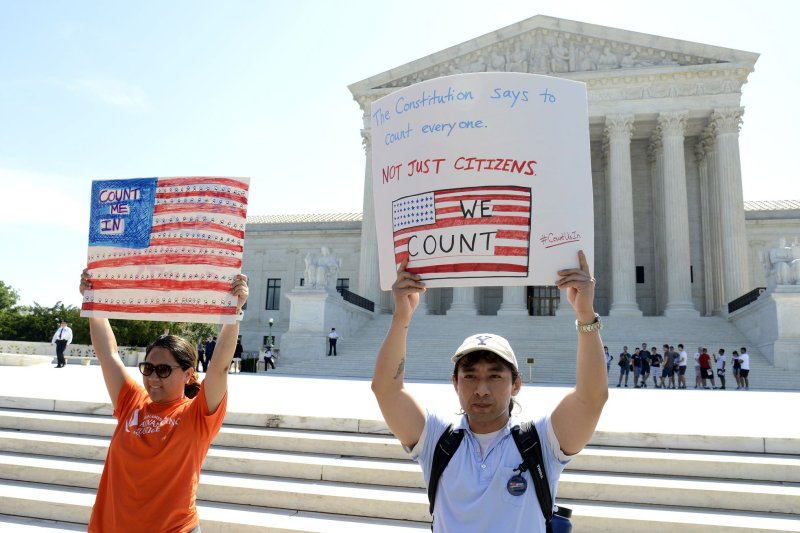1 of 5 | Demonstrators march in front of the Supreme Court, on its final day in session, on Capitol Hill on Thursday. Photo by Mike Theiler/UPI |
License Photo
June 27 (UPI) -- After several months of controversy, the U.S. Supreme Court on Thursday delivered its long-awaited ruling on whether the government can add a citizenship question to the 2020 census -- blocking the move days before federal officials begin printing materials.
The court voted 5-4 to block the Trump administration plan.
In writing for the majority, Chief Justice John Roberts said the court ruled against the citizenship question because there's insufficient grounds to have census takers ask such a question. The vote came on the last day before the court recesses for the summer.
"The evidence tells a story that does not match the explanation [Commerce Secretary Wilbur Ross] gave for his decision [to add the question]," Roberts said. "The sole stated reason seems to have been contrived."
Before Thursday, the Trump administration urged the court for weeks for a decision so it could begin printing census materials Monday. A separate challenge to the administration's motive for asking the question is still being decided in federal district court. Lower courts blocked the government from asking the question during the census next year.
Trump called the ruling "totally ridiculous" and called for a delay in the census in a series of tweets sent during his trip to Japan.
"Seems totally ridiculous that our government, and indeed Country, cannot ask a basic question of Citizenship in a very expensive, detailed and important Census, in this case for 2020," he said.
"I have asked the lawyers if they can delay the Census, no matter how long, until the United States Supreme Court is given additional information from which it can make a final and decisive decision on this very critical matter.
"Can anyone really believe that as a great Country, we are not able the ask whether or not someone is a Citizen. Only in America!"
Thursday's decision might have been somewhat of a surprise. During arguments in April, observers said justices seemed to lean slightly in favor of permitting the citizenship question, which hasn't appeared on any U.S. census since 1950.
There are two main sides to the controversy -- those who say the question will enforce and protect federal voting laws, and opponents who say it would lead to a substantial undercount, because an untold number of undocumented migrants would not participate. At least one government estimate suggested an undercount could miss up to 6.5 million people.
A substantial undercount would have steep implications for states like Arizona, California, Florida, Illinois, New York and Texas, which could lose seats in the U.S. House. Eighteen states have sued to block the question.
The American Civil Liberties Union filed a motion with the high court this week saying the motive for the question is rooted in study by GOP redistricting expert Thomas Hofeller, which said asking residents about citizenship could help Republicans and disadvantage Democrats. Documents about Hofeller's work were recently discovered by his daughter after his death.
"This ruling is a victory for immigrants and communities of color across America," the ACLU said after the ruling Thursday. "It is a victory for democracy itself. Everyone MUST come together to make sure that the 2020 Census counts every person."















